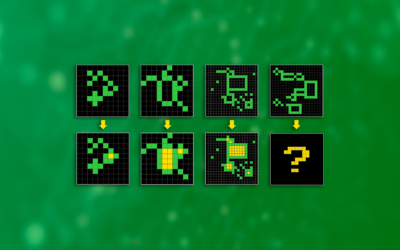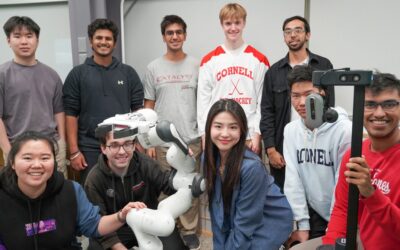Entrepreneurship at Cornell has announced that John Bicket ’02, chief technology officer and co-founder of tech firm Samsara, has been named Cornell Entrepreneur of the Year 2025. Samsara offers an AI-powered platform to help physical operations organizations improve their safety, efficiency and sustainability by using data from sensors and connected devices.
Cornell AI News
News Category
Filter by Topic
Cornell team wins $50K in AI puzzle-solving challenge contest
A team from Cornell led by Kevin Ellis, assistant professor of computer science in the Cornell Ann S. Bowers College of Computing and Information Science, has developed a set of AI models that together, solve about 56% of the problems – scoring within 4 percentage points of the average human. Their paper, “Combining Induction and Transduction for Abstract Reasoning,” received a first-place-paper award at the 2024 ARC Prize competition. Lead authors on the paper were Wen-Ding Li, a doctoral student in the field of computer science, and Keya Hu, a visiting undergraduate student in Ellis’ group.
In American fiction, it’s a small world after all
Despite being unbound by space and time, fictional protagonists in American literature travel fewer miles than their nonfiction counterparts, according to a Cornell-led research team that used artificial intelligence to analyze nearly 13,500 books from the last 230 years.
Schmidt Sciences names Sarah Dean an AI2050 Fellow
Sarah Dean, assistant professor of computer science in the Cornell Ann S. Bowers College of Computing and Information Science, has received an AI2050 Early Career Fellowship from Schmidt Sciences.
Choudhury wins Navy Young Investigator award to train robots
Sanjiban Choudhury, assistant professor of computer science in the Cornell Ann S. Bowers College of Computing and Information Science, just received a three-year, $750,000 Young Investigator Program award from the Office of Naval Research (ONR) to develop new ways to train robots to perform complex, multistep tasks, such as inspecting and repairing ship engines.
Cornell Tech alumni close $3.2 million seed round for Avina
Ron Fisher ’16, founded Avina with partners Michael Wang ’16 and Vivek Sudarsan ’16, all three of whom are graduates of Cornell Tech.
New statistical method powers research on health, climate, financial data
Machine learning and artificial intelligence wouldn’t be possible without the statistical models that underpin their analytic capabilities. A Cornell statistician and his colleague have developed a revolutionary new method to analyze complex datasets that’s more flexible, accurate and easy to use.
Rising star Ben Laufer: Improving accountability and trustworthiness in AI
With artificial intelligence increasingly integrated into our daily lives, one of the most pressing concerns about this emerging technology is ensuring that the new innovations being developed consider their impact on individuals from different backgrounds and communities. The work of researchers like Cornell Tech PhD student Ben Laufer is critical for understanding the social and ethical implications of algorithmic decision-making.








